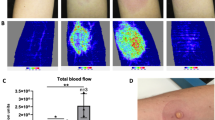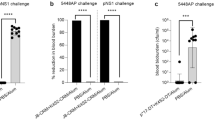Abstract
Infection with Treponema pallidum, the causative agent of human syphilis, gives rise to a complex immune response involving both humoral and cellular components. The exact nature of this response and how it relates to the disease process is a matter of considerable speculation1,2. In recent years, studies have been directed towards defining the role of cell-mediated immunity (CMI) in syphilis2. These have been conducted mainly in vitro because the general unavailability of inbred rabbits, the principal animals for experimental syphilis research, has limited the application of in vivo procedures. A prime deterrent to using mice for the study of syphilis has been their failure to exhibit pathology, even in the face of a persistent infection3,4. We report here that on intradermal (i.d.) infection, transient primary lesions, characteristic of those seen in naturally acquired human syphilis, can be produced regularly in some strains of mice but not others, indicating a genetic basis for host susceptibility. Strains of mice which normally fail to develop lesions, do so after exposure to ionising radiation. Evidence is presented for a multiple role of the immune response during local infection.
This is a preview of subscription content, access via your institution
Access options
Subscribe to this journal
Receive 51 print issues and online access
$199.00 per year
only $3.90 per issue
Buy this article
- Purchase on Springer Link
- Instant access to full article PDF
Prices may be subject to local taxes which are calculated during checkout
Similar content being viewed by others
References
Pavia, C. S., Folds, J. D. & Baseman, J. B. Br. J. vener. Dis. 54, 144–150 (1978).
Metzger, M. Br. J. vener. Dis. 55, 94–98 (1979).
Gueft, B. & Rosahn, P. D. Amer. J. Sphy. Gon. vener. Dis. 32, 59–83 (1948).
Wright, D. J. M. & Wharton, F. P. J. med. Microbiol. 10, 245–247 (1977).
Salussola, D., Fabry, J., Monier, J-C. & Sepetjian, M. Path. Biol. 24, 245–249 (1976).
Allen, E. M., Moore, V. L. & Stevens, J. O. J. Immun. 119, 343–347 (1977).
Plant, J. & Glynn, A. A. J. infect. Dis. 133, 72–78 (1976).
Turner, T. B. & Hollander, B. H. WHO Monogr. Ser. No. 35 (1957).
Storer, J. B. in The Biology of the Laboratory Mouse (ed. Green, E. L.) 427–446 (Dover, New York, 1975).
Pacha, J., Metzger, M., Smogor, W., Michalska, E., Podwinska, J. & Ruczkowska, J. Archs Immun. Ther. Exp. 27, 45–51 (1979).
Ohta, Y. J. Immun. 108, 921–926 (1972).
Hardy, P. H. & Nell, E. E. Infect. Immun. 11, 1295–1299 (1975).
Author information
Authors and Affiliations
Rights and permissions
About this article
Cite this article
Klein, J., Monjan, A., Hardy, P. et al. Abrogation of genetically controlled resistance of mice to Treponema pallidum by irradiation. Nature 283, 572–574 (1980). https://doi.org/10.1038/283572a0
Received:
Accepted:
Issue Date:
DOI: https://doi.org/10.1038/283572a0
Comments
By submitting a comment you agree to abide by our Terms and Community Guidelines. If you find something abusive or that does not comply with our terms or guidelines please flag it as inappropriate.



